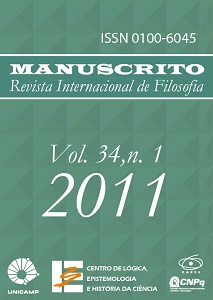Resumo
Humans have used arguments for defending or refuting statements long before the creation of logic as a specialized discipline. This can be interpreted as the fact that an intuitive notion of “logical consequence” or a psychic disposition to articulate reasoning according to this pattern is present in common sense, and logic simply aims at describing and codifying the features of this spontaneous capacity of human reason. It is well known, however, that several arguments easily accepted by common sense are actually “logical fallacies”, and this indicates that logic is not just a descriptive, but also a prescriptive or normative enterprise, in which the notion of logical consequence is defined in a precise way and then certain rules are established in order to maintain the discourse in keeping with this notion. Yet in the justification of the correctness and adequacy of these rules commonsense reasoning must necessarily be used, and in such a way its foundational role is recognized. Moreover, it remains also true that several branches and forms of logic have been elaborated precisely in order to reflect the structural features of correct argument used in different fields of human reasoning and yet insufficiently mirrored by the most familiar logical formalisms.Referências
AGAZZI, E. Modern Logic. A Survey (ed.), Reidel, Dordrecht, 1981.
AGAZZI, E. Probability in the Sciences (ed.), Kluwer, Dordrecht, 1988a.
AGAZZI, E. “Probability: A Composite Concept”. 1988b. In Agazzi (1988a), p. 3-26.
BELNAP, N. D. “Modal and Relevant Logics: 1977”. In Agazzi (1981), p. 131-151.
CARNAP, R. Die logische Syntay der Sprache, 1934. Engl. trans. The Logical Syntax of Language, Routledge Kegan Paul, London, 1937.
COHEN, L. J. The Implications of Induction, Methuen, London, 1970.
COHEN, L. J. The Probable and the Provable, Oxford Univ. Press, Oxford, 1977. “Inductive Logic 1945-1977”. In Agazzi (1981), p. 353-375.
HAAK, S. Philosophy of Logic, Cambridge Univ. Press, Cambridge, 1978.
KANT, I. Anthropologie in pragmatischer Hinsicht. Frankfurt am Main: Suhrkamp, Band XII, 1977.
KANT, I. Gesammelte Schriften. Editado pela Preussische. Akademie der Wissenschaften, Berlin, 1902.
KLEIN, F. Vergleichende Betrachtungen über neuere geometrische Forschungen, Deichert, Erlangen, 1872.
LUKASIEWICZ, J. Aristotles’s Syllogistic from the Standpoint of Modern Formal Logic, Oxford Univ. Press, Oxford, 2nd edition, 1957.
POINCARÉ, H. La science et l’hypothèse, Flammarion, Paris, 1902.
PRANTL, C. Geschichte der Logik im Abendlande, Leipzig, 4. Vols, 1855-1870.
SKOLEM, T. “Begründung der elementaren Arithmetik durch die rekurrierende Denkweise ohne Anwendung scheinbarer Veränderlichen mit unendlichem Ausdehnungsbereich”, Skrifter utgit av Videnskapsselkapet i Kristiania, I. Mathematisk-videnskabelig klasse, n. 6, p. 1-38, 1923.
VERNEAUX, R. Epistémologie générale, Beauchesne, Paris, 1959.
VON WRIGHT, G. H. An Essay on Modal Logic, North Holland, Amsterdam, 1951.
VON WRIGHT, G. H. “Problems and Prospects of Deontic Logic. A Survey” In Agazzi (1981), p. 399-423.


